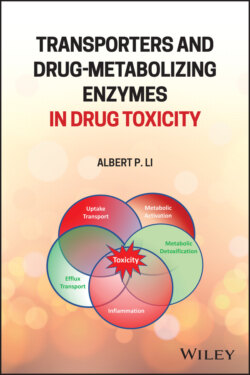Читать книгу Transporters and Drug-Metabolizing Enzymes in Drug Toxicity - Albert P. Li - Страница 70
3.7 Obeticholic Acid
ОглавлениеObeticholic acid (6a‐ethyl‐chenodeoxycholic acid (OCA) is a farnesoid X receptor (FXR) agonist approved by FDA in May 2016 under the accelerated approval program for the treatment of primary biliary cholangitis (PBC) [125]. PBC is a chronic autoimmune cholestatic liver disease that predominantly affects women in early to middle age. It is typically associated with autoantibodies to mitochondrial antigens and results in immune‐mediated destruction of small and medium‐sized intrahepatic bile ducts leading to cholestasis, hepatic fibrosis and may progress to cirrhosis or hepatic failure and, in some cases, hepatocellular carcinoma [126–129].
FXR is an orphan nuclear hormone receptor found in the nucleus of cells in the liver, intestine, kidney, and adrenal glands [130–132] with bile acids – chenodeoxycholic acid, lithocholic acid, and deoxycholic acid as ligands [131]. OCA activation of FXR leads to reduction of hepatic bile acids via two mechanisms: (i) Reduction of the synthesis of the bile acid precursor, cholesterol, via downregulation of CYP7A1, the key enzyme for cholesterol synthesis [132, 133], and (ii) Upregulation of the efflux transporters of bile acids, BSEP [134], OST‐a, and OST‐b [135, 136].
OCA is used either as a single therapy or in combination with ursodeoxycholic acid (UDCA) in adult patients, for the 40% of PBC patients with an inadequate response to UDCA, and for the 10% of PBC patients who is unable to tolerate UDCA. As an agonist of FXR, OCA treatment reduces bile acid synthesis. The clinical efficacy of OCA was clearly demonstrated in PBC patients using plasma biomarkers for liver, alkaline phosphatase, gamma‐glutamyl transpeptidase, and alanine aminotransferase as biomarkers of PBC progression [126–129,137–142].
OCA administration has been associated with liver damage [143]. As a result of the occurrence of 19 deaths associated with OCA treatment, the FDA released not only a Drug Safety Communication on 21 September 2017, warning of serious liver injury caused by OCA due to incorrect dosing but also a Boxed Warning. FDA is also requiring a Medication Guide for patients to inform them about this issue (see weblink: FDA Adds Black Box Warning to Intercept’s Liver Disease Medicine | 2018‐02‐06 | FDANews).
